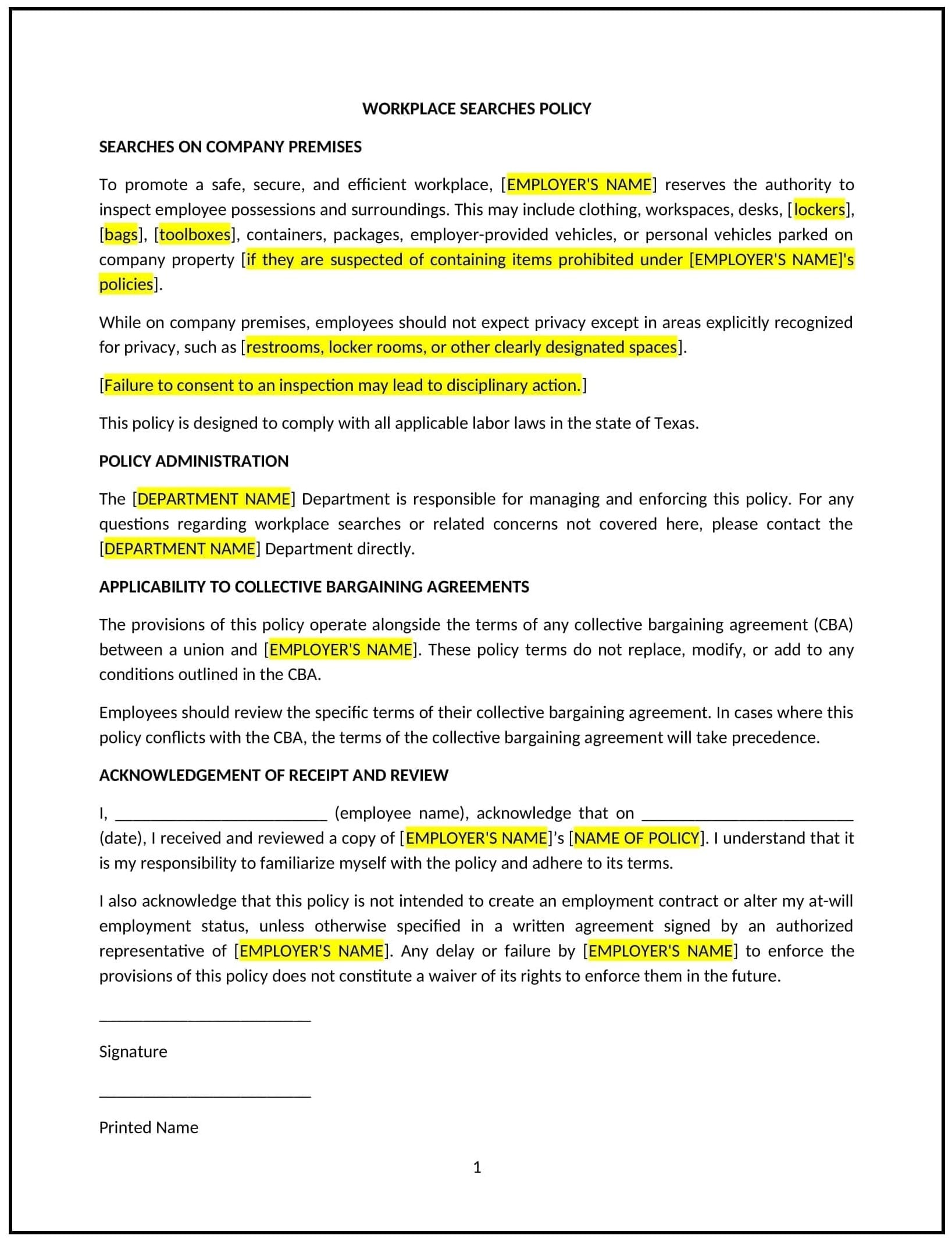Got contracts to review? While you're here for policies, let Cobrief make contract review effortless—start your free review now.

Customize this template for free
Workplace searches policy (Texas)
This workplace searches policy is designed to help Texas businesses outline the guidelines and procedures for conducting searches of employees, their workspaces, and personal belongings in the workplace. The policy ensures that workplace searches are conducted in a manner that respects employees' privacy rights while protecting the company’s assets, safety, and legal interests.
By adopting this policy, businesses can maintain a secure work environment, strengthen compliance with Texas state laws, and reduce the risk of theft, misconduct, or other violations of company policy.
How to use this workplace searches policy (Texas)
- Define the scope of searches: Clearly define the types of searches that are permitted, such as searches of employees' personal belongings, lockers, desks, bags, or electronic devices. The policy should specify under what circumstances these searches may take place, such as suspicion of theft, drug use, or other misconduct.
- Establish employee consent: Specify that employees may be required to consent to searches as a condition of employment. The policy should explain the expectation that employees will cooperate with workplace searches and outline how consent will be obtained (e.g., via an acknowledgment in the employee handbook or employment contract).
- Outline search procedures: Provide a clear process for conducting searches, including who is authorized to perform the search (e.g., HR personnel, security staff), the procedures for notifying employees before a search is conducted, and any precautions to protect employees' privacy during the search process.
- Address the handling of personal items: Specify how personal items will be handled during a search, including safeguards for privacy and security. The policy should state that only items related to the suspected issue will be searched and that employees' personal items will be treated respectfully.
- Set limits on searches: Clearly outline the limitations on searches to ensure that they are reasonable and do not infringe upon employees’ rights. The policy should specify that searches will only be conducted when necessary and appropriate based on a valid reason or suspicion.
- Address confidentiality: Ensure that the results of searches and any related information are kept confidential, with disclosure only to authorized personnel or when required by law.
- Define consequences of refusal: Specify the potential consequences for employees who refuse to cooperate with a search, which may include disciplinary action or termination of employment, depending on the severity of the refusal and the circumstances.
- Ensure compliance with Texas law: Ensure that the policy is in compliance with Texas state laws and federal regulations related to privacy, employee rights, and workplace searches.
Benefits of using this workplace searches policy (Texas)
This policy offers several benefits for Texas businesses:
- Enhances workplace security: By clearly outlining when and how workplace searches may occur, businesses can help protect company assets, reduce theft, and ensure a safer work environment.
- Promotes a fair and consistent approach: A clearly defined policy ensures that workplace searches are conducted fairly and consistently across the organization, minimizing the potential for discrimination or favoritism.
- Reduces legal risks: By adhering to Texas state laws and federal regulations governing workplace searches, businesses can reduce the risk of legal challenges related to privacy violations or unlawful searches.
- Protects company interests: Workplace searches can help identify misconduct, theft, or other violations of company policies, which helps protect the company’s resources and maintain a respectful workplace environment.
- Ensures employee understanding: Clear communication of the policy helps employees understand the circumstances under which a search may take place and the company’s expectations for cooperation.
- Demonstrates a commitment to fairness: A transparent and respectful approach to workplace searches helps foster trust and goodwill between employees and the employer.
Tips for using this workplace searches policy (Texas)
- Communicate the policy clearly: Ensure that all employees are aware of the workplace searches policy, including the types of searches that may be conducted, the procedures in place, and the expectations for cooperation. This can be communicated during onboarding, through employee handbooks, or via internal communication.
- Obtain employee consent: Make sure that employees acknowledge and consent to the policy as part of their employment agreement or as a condition of employment.
- Conduct searches respectfully: When performing searches, ensure that employees' privacy is respected, and only conduct searches that are necessary to address specific concerns.
- Be consistent in enforcement: Apply the policy consistently to all employees to avoid potential discrimination claims and ensure fairness in how searches are handled.
- Keep search results confidential: Handle the results of searches with care and ensure that any confidential information obtained during a search is only shared with authorized personnel.
- Review and update regularly: Periodically review the policy to ensure it remains in line with Texas state laws, federal regulations, and company practices, and update it as necessary to address new legal developments or operational needs.